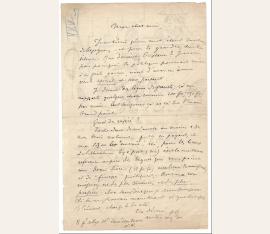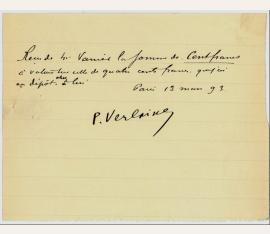Dichter (1844–1896). Autograph document signed. Paris. 1 S. Qu.-kl.-8vo. Gerahmt.
$ 4,824 / 4.500 €
(24850)
A signed receipt from Verlaine accepting a payment from his publisher Léon Vanier, about a book on Arthur Rimbaud and Albert Merat. Billet signé par Verlaine au sujet de son travail sur l’œuvre de Arthur Rimbaud et de Albert Merat, qui fut le souffre douleur de Rimbaud et Verlaine dans le fameux « Sonnet du trou du cul ». - Verlaine accuse réception de la somme de vingt francs reçu de son éditeur Léon Vanier.
ecrivain (1844-1896). Two exceedingly desirable ALSs in French, both signed “PV,” written to Edmond Lepelletier. Londres 29 mai. 8vo. 3 pp.
$ 51,992 / 48.500 €
(46947)
The first is one page, 5.25 x 8, May 29, [1873]. In part (translated): “I arrived here the day before yesterday in the morning from Anvers. Crossing during 15 hours, such an incredible beauty. Besides, I am never sick when traveling on a boat. I shall throw this in the mail soon to give you my address and to ask you to take good care of Gustave. Write me soon and prepare the work. As soon as the printer approves it, Macte animo generose puer." The second is one page both sides, 5.25 x 8, no date but circa June 1873.
In part (translated): "I am writing you just a word…to scold you on your silence. What is happening for Gustave? I do not see why politics could hurt such a frail boy, doomed in advance to some special sale and one of the few to be up to it. I give some French lessons, it pays me something like 100 or 150 francs per month. This is always something and it kills boredom…What about the case? Try then to get me at least one of my three volumes, even by paying and send it to me: here, for the literature lessons 'by a poet,' it is the best reference you can give the maniacs who fork out half a pound (12 fr. 50) a lesson in versification and poetic 'finesses.' So my request is all but serious and urgent; it goes without saying that I will pay. If you are not able to do it now and you see Blemont, ask him this for me." On the reverse of this letter, Verlaine pens a wild half-page caricature sketch, labeling it "Le Shah de visu." Below, he pens a lengthy note, in part (translated): "Doesn't he look just like the poor Monsieur de la Chauviniere? Besides, you'll see him shortly. Here, we are enjoying lovely French troupes, Desclée, etc.—the artists of Mr. Humbert, from Brussels, the entire repertoire of Offenbach, Herve, Lecoq, etc.—you can get all the tickets you want but it is so hot here!" Central vertical and horizontal folds, light scattered staining, and various pencil notations, otherwise fine condition. Verlaine and Rimbaud had begun their short but torrid affair in Paris in late 1871, their volatile relationship bringing them to London in September 1872; at the conclusion of both letters, Verlaine pens his address, 8 Grate College Street, Camden Town, which they had rented on May 28, 1873, living in decadent squalor in two rooms on the top floor. Here they supported themselves by teaching French verse, as mentioned here, and their relationship grew increasingly strained—their self-destructive instincts came to characterize their existence, with relentless arguing and fighting. Verlaine fled to Brussels in early July after a particularly exhausting quarrel, and Rimbaud followed shortly thereafter—only for Verlaine to famously shoot him twice in the wrist in a drunken rage. These fantastic letters describe the general goings-on of this tumultuous period, with the second highlighted by a fabulous sketch and both artistic and literary content; this letter especially offers important insight into this period, and is quoted and contextualized at length in Graham Robb's acclaimed 2001 biography of Rimbaud (pg. 209)..
Dichter (1844-1896). Eigenh. Quittung mit U. ("P. Verlaine"). Paris. 13.03.1893. 1 S. Qu.-8vo.
$ 1,608 / 1.500 €
(32725/BN26580)
VERLAINE, PAUL. 1844-1896. Note Signed ("P. Verlaine"), 1 p, 12mo, Paris, March 13, 1893, receipt for the sum of 100 francs received from M. Vanier, right and lower margins rough, perforation at left margin. Verlaine receives an advance from his publisher Leon Vanier, likely against the publication of Mes Prisons, which appeared the same year.
Dichter (1844-1896). Eigenh. Gedicht mit U. O. O. Neun Strophen zu je vier Zeilen auf 2 SS. 8vo.
$ 4,074 / 3.800 €
(88867/BN58810)
Stark bearbeitetes Manuskript mit einigen Varianten zur gedruckten Fassung: "Ponchon, vous n'êtes pas raisonnable non plus, | Écoutez ma semonce. | Eh quoi! vous vous rangez dans les gens dissolus | Dont rougirait Alphonse, || Qui font la honte, ayant de l'esprit à gogo, | De toute notre époque. | Notre epoque n'est plus celle du pére Hugo | - Encore un beau loufoque […] Quinze jours de prison pour outrages à la Sainte Magistrature ... | Mais je me trompe: à la morale, et me voilà | Prêt à toute rature.
|| Car je ne suis pas, moi, comme vous, bon Raoul, | De l'opposante race, | Et que me fait d'ailleurs que tel juge maboul | Soit un pur pederasse […]". - Der Dichter Raoul Ponchon war am 11. November 1891 wegen Beleidigung der öffentlichen Moral zu fünfzehn Tagen Gefängnis verurteilt worden, nachdem am 13. September desselben Jahres im "Courrier français" sein "Reimblatt" mit dem Titel "Vieux Messieurs" veröffentlicht worden war, das in obszönen Versen auf eine kürzlich stattgehabte Sexaffäre anspielte. - Stärker fleckig und mit kleinen Randläsuren; ein restaurierter Falteinriss teils wieder gerissen..
sold
E. Brief mit U.
Autograph ist nicht mehr verfügbar
Paul Verlaine (1844–1896), Dichter. E. Brief mit U. („P. Verlaine“). [Paris, 22. Dezember 1890]. 1 S. auf Doppelblatt. Kl.-8°. Mit e. adr. Kuvert. – An seinen Verleger Léon Vanier (1847–1896) mit der Mitteilung, daß er diesen wahrscheinlich übermorgen, am Dienstag, besuchen käme, sofern es ihm selbst gesundheitlich besser gehe. Dann könnten sie einen ganzen Nachmittag lang alles erledigen: sich unterhalten und sich der Auswahl der Prosamanuskripte widmen sowie den Brief an S… schreiben: „[...] j’irai chez vous dans une longue après-midi: nous causerons, travaillerons au triage des manuscrits en prose, ferons la lettre à S…, enfin règlerons bien toutes affaires [...]“. Er schließt mit der Bitte, daß Vanier doch das Buch, wenn es erschienen sei, an Moréas schicken möge: „Envoyez moi le livre à Moréas, si paru [...]“. – Papierbedingt leicht gebräunt und mit einem kleinen Einriß im Mittelfalz, sonst wohlerhalten.
E. Brief mit U.
Autograph ist nicht mehr verfügbar
Paul Verlaine (1844–1896), French poet. Autograph letter signed. N. p., November 29, 1894. Large 8°. 1 p. – To his girlfriend, Eugénie Krantz: „Ma chère Eugénie, je suis forcé d’être au repos absolu pendant quelques jours , au bout desquels t’écrira ton | P. Verlaine“. – Exhausted by perpetual quarrels with his his gilfriend, Paul Verlaine was hospitalized at the Hopital Bichat the day after and remained there until January 1895. – Slightly browned due to paper, and with small damages to edges.
Eigenh. Brief mit U. („P. Verlaine“).
Autograph ist nicht mehr verfügbar
To Catull Mendes, telling him that Ladislas Loëvy will draw a portrait of him that will be used for the frontispiece of his next book: „Mon cher Mendès, Je vous recommande M. Ladislas Loëvy, jeune homme de beaucoup de talent qui désire faire mon portrait pour la vie populaire. Votre P. Verlaine. 14 rue Royer Collard“. – Slightly browned due to paper.




